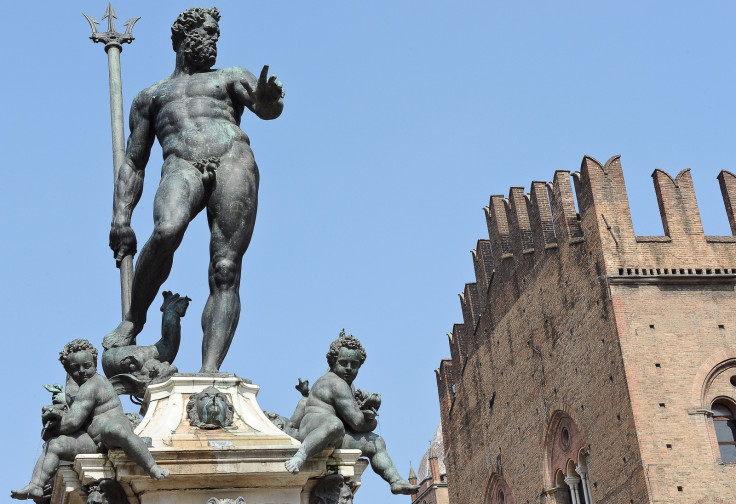Facebook blocks photo of historic naked Neptune statue for 'explicit content'
'Maybe Facebook would prefer the statue to be dressed again,' local writer Elisa Barbari wrote.

Facebook has once again drawn sharp criticism over its censorship policies after the social media giant reportedly blocked a photo of the historic naked statue of the sea god Neptune that stands in the Piazza del Nuttuno in Bologna, Italy. Local writer Elisa Barbari said she chose a photograph of the 16th century 3.2-metre high bronze Renaissance statue of the sea god holding a trident to illustrate her Facebook page titled, "Stories, curiosities and views of Bologna," The Telegraph reported.
However, Facebook reportedly objected to the nude image of the iconic statue. In a statement, the social media company told Barbari: "The use of the image was not approved because it violates Facebook's guidelines on advertising. It presents an image with content that is explicitly sexual and which shows to an excessive degree the body, concentrating unnecessarily on body parts.
"The use of images or video of nude bodies or plunging necklines is not allowed, even if the use is for artistic or educational reasons."
Barbari quickly took to Facebook to voice her irritation and incredulity over the incident saying: "How can a work of art, our very own statue of Neptune, be the object of censorship?"
"I wanted to promote my page but it seems that for Facebook the statue is a sexually explicit image that shows off too much flesh. Really, Neptune? This is crazy!" she wrote. She also posted another photo of Neptune with the words saying: "Yes to Neptune, no to censorship."
"Back in the 1950s, during celebrations for schoolchildren graduating, they used to cover up Neptune," Barbari said. "Maybe Facebook would prefer the statue to be dressed again." The statue was created by Flemish sculptor Jean de Boulogne in the 1950s and has since been nicknamed Giambologna by the Italians.
Dopo il pasticcio della censura di fb sulla mia foto del Nettuno, ci siamo indignati, stizziti, allibiti o ci siamo...
Posted by Elisa Barbari on Sunday, January 1, 2017
A company spokesperson later admitted that the censorship of the nude statue was a mistake, the Guardian reports.
"Our team processes millions of advertising images each week, and in some instances we incorrectly prohibit ads. This image does not violate our ad policies. We apologise for the error and have let the advertiser know we are approving their ad."
The latest incident follows a string of controversies over deleted content and fierce backlash targeting Facebook over censorship. In recent months, Facebook has also come in for sharp criticism regarding the spread of fake news on its platform.
In October last year, Facebook apologised after removing a video from the Swedish Cancer Society that featured simple animations of the female body to promote breast cancer awareness and educate women on how to check for suspicious lumps. Under the company's policies, the images were previously deemed "offensive".
In September, Facebook drew widespread criticism over its controversial censorship of the iconic Pulitzer Prize-winning "napalm girl" photograph taken during the Vietnam War in 1972 after a Norwegian writer posted it with a series of photographs that changed the history of warfare. Facebook removed the post on the grounds that it contained nudity.
News organisations, Norwegian politicians and experts from around the globe slammed the company over its decision, citing the platform's growing influence as an increasingly popular source of news for many users.
The company eventually reversed its position and issued an apology.
"An image of a naked child would normally be presumed to violate our Community Standards, and in some countries might even qualify as child pornography," the company said in a statement. "In this case, we recognise the history and global importance of this image in documenting a particular moment in time.
"Because of its status as an iconic image of historical importance, the value of permitting sharing outweighs the value of protecting the community by removal."
In November, Facebook removed and later restored a photo of Lasse Gustavson, a former Swedish fireman whose face was permanently disfigured in an oil depot explosion when he was a young man 35 years ago. His friend Bjorn Lindeblad posted the image to celebrate Gustavson's 60th birthday.
The previous month, Facebook announced changes to its editorial policies saying it would no longer censor explicit posts if they are deemed "newsworthy, significant or important to the public interest".
"Our intent is to allow more images and stories without posing safety risks or showing graphic images to minors and others who do not want to see them," Joel Kaplan, vice president of global public policy, and Justin Osofsky, vice president of global operations and media partnerships, wrote in a blog post.
© Copyright IBTimes 2025. All rights reserved.





















